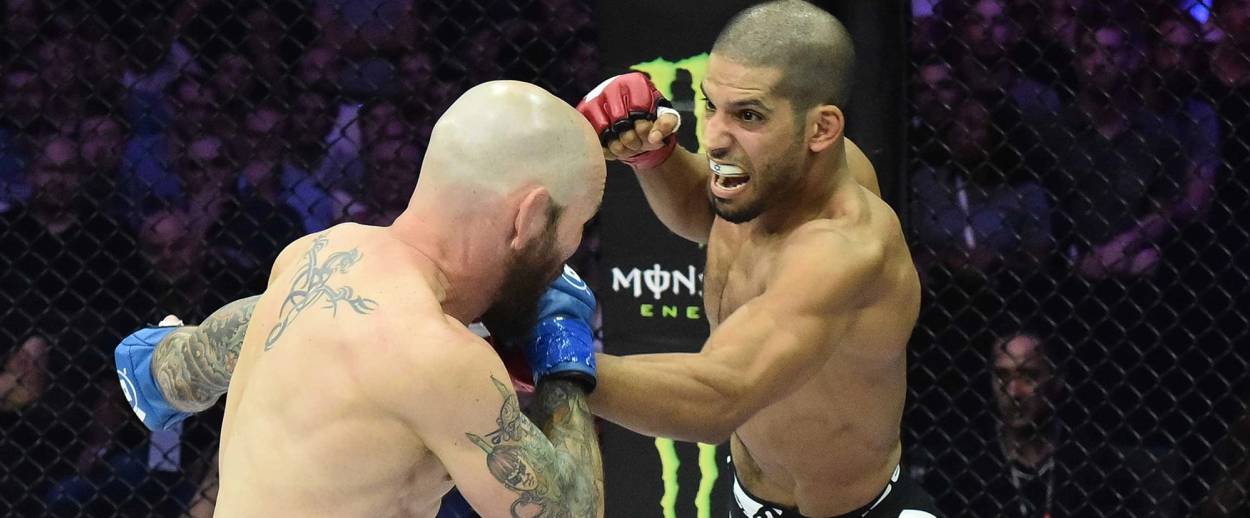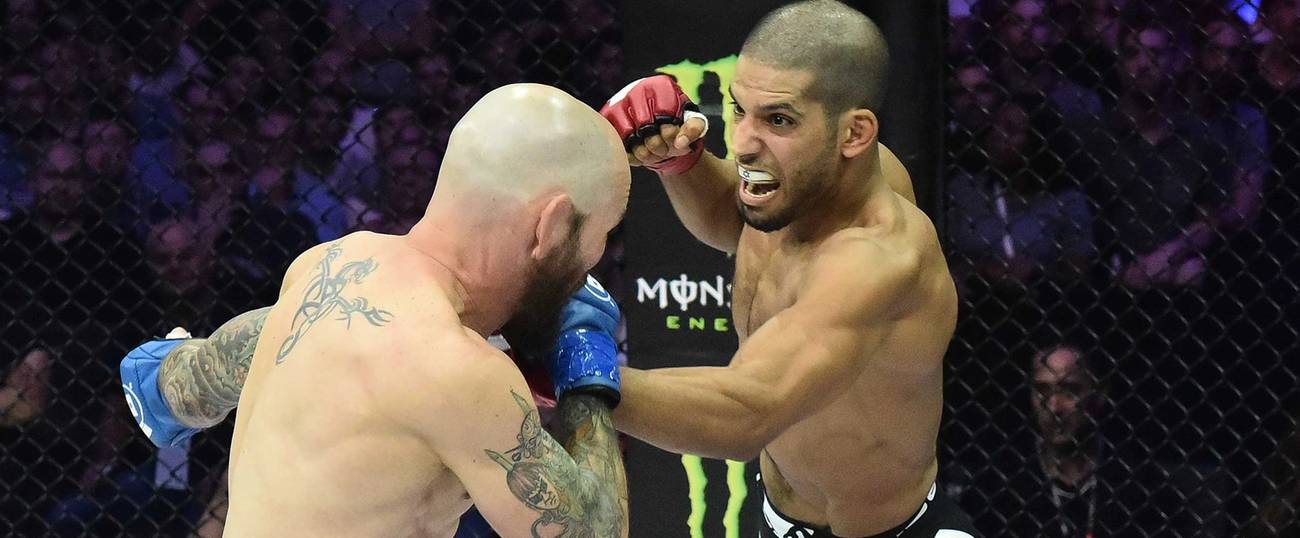Israeli MMA Fighter Noad Lahat, From the Octagon to Gaza and Back
The mixed martial artist takes his love of the Jewish state into the ring tonight in Chicago




“It’s always Jews who want to know if I’m religious,” Noad Lahat told me over the phone from his Las Vegas home, followed by a chuckle as a dog barked in the background. I tried explaining that the existence of a Jewish professional athlete is interesting to other Jews, especially considering that earlier in our conversation he told me that his father is an Orthodox rabbi, which is not exactly the sort of job you expect for the father of a professional mixed-martial-arts fighter—one who’s a 5’8”, 145-pound slab of pure muscle.
“I don’t really like labels. I see myself as a Jew,” Lahat said. “Yes, I observe—I keep Shabbat, and eat kosher—but I really believe that it’s between me and God.”
Lahat does fight on Shabbat. I mean professionally, not the way most of us do when our families gather around the table. But that’s really neither here nor there.
One of the fighter’s younger brothers, Elon, said the need to be right is one of the things that drives Noad, that he attacks every verbal debate with the zeal of a man expecting the loser to be sentenced to death. It could be the Israeli in him; the country’s citizens aren’t known for being open to differing opinions—and Yemenite Israelis like Lahat might be the most stubborn of the bunch. But his friend and longtime manager, Bob Cook, had a different way of describing the fighter’s personality. “He’s definitely a man willing to speak his mind,” Cook said.
From Colin Kaepernick’s kneeling to LeBron’s stumping for Hillary, today’s athletes have grown increasingly comfortable in leveraging their platforms into raising public awareness for specific political and social causes. Lahat is no different. Not only is the 32-year-old—who will be looking to boost his career record of 10-2 tonight in Rosemont, Illinois on a card for the mixed-martial-arts company Bellator—one of the few Israeli athletes who regularly competes in the United States, but he’s also, by far, the most vocally supportive of his native country.
When Lahat enters the rings before fights, he does so donning a blue hat with a white Star of David stitched onto the front. He routinely shares pro-Israel tweets posted by Benjamin Netanyahu and Donald Trump (whether you think those, especially the latter, represent a poor form of advocacy is a different subject). And then there was his decision in July 2014, during Israel’s conflict with Hamas in Gaza, to hop on a plane and re-enlist in the Israeli army the day after a fight.
“You can’t achieve peace without being ready for war,” he said in an interview with CNN about 12 hours after defeating the fighter Steven Siler in an Ultimate Fighting Champion event. “If people are attacking you and they’re not going to stop until you’re dead, then you have to go and fight. There’s no other way.
“It’s just another round of this ridiculous game,” he continued. “Hamas are shooting at us. We try to respond, but we can’t because most of the world don’t let us finish the job and take Hamas down. So we stop, and then they’re shooting again.”
***
The first time Noad Lahat told his parents that he wanted to be a professional fighter, well, you can probably guess how his mother, the Yemenite Israeli wife of an Orthodox rabbi, reacted. “She wanted to know what was wrong with me; she thought I lost my mind,” Lahat said. “She was saying, ‘That’s not how you make a living.’ They expected me to go to college and everything. It was a difficult talk.”
But there was no stopping Lahat from following his passion. He started fighting at the age of 5, with judo classes in the Israeli settlement of Alfei Menashe, a small outpost about a mile east of the Green Line. Noad was born there, the oldest of three (two boys, one girl), in what he described as a “very traditional family.” It was fighting, though, that triggered a fire within. “Noad’s the kind of guy who becomes obsessive over things,” Elon said. “So he became obsessed with being the best fighter.” He’d train two to three times a day. At holiday meals, while everyone around the table was downing heaping portions of challah and other Yemenite goodies, he’d watch his portions so that he could cut weight.
By the time he joined the IDF at the age of 18—military service is mandatory in Israel—Lahat had developed to the point of qualifying for one of Israel’s “Outstanding Athlete” labels, a category reserved for the best of the best. Individuals who fall under this umbrella are granted easier service—desk jobs as opposed to firefights. The thinking is that certain people who possess certain unique talents can best serve their country in other ways. But Lahat rejected this designation.
“My dad was a general in the special forces, my mom was a general in the intelligence forces, this is what we do,” he told me. “We all recognize this while growing up, there’s no way around it.”
He spent three years in the IDF’s paratroopers unit, but he never stopped training. On weekends off he’d stop at his local gym and squeeze in a quick session. Then, following the completion of his service, like so many Israeli soldiers, he decided to take some time off and travel the world. He landed in Copacabana, a beach neighborhood in Rio de Janeiro. The plan was to stay in Brazil for two weeks, then meet some friends in Argentina.
He wound up staying for close to six months. He had stumbled upon a jiujitsu gym and fallen in love. He became a champion jiujitsu fighter, made his way over to California with a woman he met in Brazil named Stephanie, an Orange County native who would later convert to Judaism and who Noad would later marry and have a son with. Stephanie lived near a famous MMA gym, San Jose’s American Kickboxing Academy. Lahat walked in, introduced himself and—just like that—a career that only one other Israeli had ever had (a little-known fighter named Moti “The Hammer” Horenstein fought for the UFC in the late ’90s) was born.
***
Let’s set the scene. It was July 26, 2014, and Lahat had just been deemed, in a unanimous decision, the winner of a featherweight bout against Siler. Earlier that summer members of Hamas had kidnapped and murdered three Israeli teenagers; in response, a group of Israeli settlers kidnapped and murdered a Palestinian teenager the day after the three Israelis were buried. The back-and-forth ignited the always-burning flame that is the Palestinian-Israeli conflict. By the night Lahat stepped into UFC’s octagon, most of his friends and platoon had been called into reserve duty for Israel’s raid on Gaza. One had been shot in action. Lahat had been in gunfights before. He knew what kind of danger awaited his friends.
So there he stood, shirtless and sweaty with his muscles pulsing, a smile stretching across his face. It was time for his post-fight interview with Fox broadcaster Joe Rogan.
“It was a great fight, now you won this fight, and you will now go back to Israel to fight for your country,” Rogan said to Lahat and into his microphone. “This is an incredibly intense time there right now, give us your thoughts on that and what this means to you.”
Lahat answered by explaining why he felt the need to go back to Israel, how he feels it’s his duty, as an Israeli, and a Jew, to defend the country. He brought up his parents as example, telling the crowd and the millions of people watching on TV that their city of Petah Tikvah (where the family had moved) was being bombed repeatedly and that each time his parents had just 15 seconds to flee for shelter.
“As a combat soldier, there’s nothing I want in the world more than peace,” Lahat added.
Agree or not—with him and his personal politics, or with Israel and its policies—there’s something admirable about a man willing, at the height of success, to put his personal desires aside and submit himself to something greater. “That fact that Jews can, for the most part, do what they want today—never in the 2,000 years before Israel was that the case,” Lahat told me. “The only way that’s possible is if Israel has a strong army, and so at that point, I was thinking, ‘What does my country need me to be right now, an athlete or a combat soldier?’ ”
The next day he boarded a flight to Tel Aviv.
In the three years since, Lahat has paid for his decision. “He’s received a lot of really anti-Semitic criticism and threats in the past,” Stephanie told me. Most of them, she said, came through social media. Some, she added, contained vile language or hostile words about her and her son. I asked if she’d be willing to share any specifics. “I’d prefer not,” she replied. “I’ll just say this: It’s been very eye-opening for me in terms of the connection between sports and politics, and how connected sports are with world affairs. It’s not so much personal hatred toward him, it’s just that he’s kind of a symbol of some of the things going on in the world.” Still, neither he nor those close to him expressed any regrets for the decisions he’s made.
“It’s not like he ever planned on being an advocate,” Stephanie said, “He’s just proud to be an Israeli and Jew. This is who he is. There’s no turning it off.”
Last fall, just about three months before our phone call, Lahat traveled back to Israel once again. On a cool and clear night, about 9,000 people filed into Tel Aviv’s Menora Mivtachim Arena to watch their fellow Israeli make his Bellator debut in the first MMA event hosted by the country. When Lahat first heard about the card he told Cook, his manager, that he had to get him on it. He did, and so here he was, fighting on the land he had fought for.
The crowd roared as Lahat was introduced. Less than three minutes later he had his opponent, Scott Cleve, pinned in a chokehold. The fight was called, with Lahat declared the winner. Euphoric, Lahat leapt to his feet, climbed to the top of the octagon, where he was handed an Israeli flag. He unfurled it, and waved it back and forth. He then jumped into the bouncing, welcoming arms of the fans sitting ringside.
Yaron Weitzman is regular contributor to Bleacher Report and senior writer for SLAM magazine. His work has also appeared in The New Yorker, New York, and The Ringer. His Twitter feed is @YaronWeitzman.